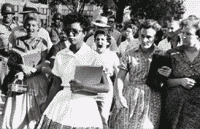Ark. town celebrates little-known turning point for civil rights

 The city of Little Rock, Arkansas is busy preparing for the 50th anniversary of a turning point in the civil rights struggle: the fall of 1957, when nine black students faced down a mob to integrate Little Rock Central High School.
The city of Little Rock, Arkansas is busy preparing for the 50th anniversary of a turning point in the civil rights struggle: the fall of 1957, when nine black students faced down a mob to integrate Little Rock Central High School.
It promises to be quite an event -- last month, even the U.S. Mint issued a commemorative silver dollar showing the students making history as they defied taunts and violence to claim their place in history.
But -- as usual -- there's more to the story.
This weekend, residents of the small western town of Charleston, Arkansas will commemorate the night in July 1954 that schools quietly voted to integrate, three years before Little Rock -- making Charleston the first school in Arkansas to obey Brown v. Board of Education.
The Arkansas News Bureau reports on the fascinating story today:
In late August of that year, Charleston quietly admitted 11 black children throughout all grades and made Arkansas history. Three weeks later, Fayetteville opened school and integrated its high school.
Charleston's superintendent, Woodrow Haynes, had decided to remain quiet about the integration to head off trouble, and had persuaded everyone in town to do the same. When a couple of out-of-town reporters called him about plans to integrate, he simply denied any such thing. Then, to set the record straight after Fayetteville's action, Charleston let everyone know it had integrated three weeks before.
Interestingly, the story notes that Charleston locals didn't put up much of a fuss about integration -- until 1957, when the confrontation in Little Rock stirred local whites into opposition.
Also of interest: aside from setting the pace for school integration in Arkansas -- and paving the way for the nationally-seismic Little Rock struggle -- the events in Charleston had another effect: launching the career of legendary Arkansas politician Dale Bumpers, a small-town lawyer who joined the Charleston school board just as integration was unfolding.
Bumpers went on to be a defining "New South" governor in the 1970s, and U.S. Senator until 1999 -- and he credits it all to the quiet civil rights struggle in Charleston, Arkansas 50 years ago.
Tags
Chris Kromm
Chris Kromm is executive director of the Institute for Southern Studies and publisher of the Institute's online magazine, Facing South.
